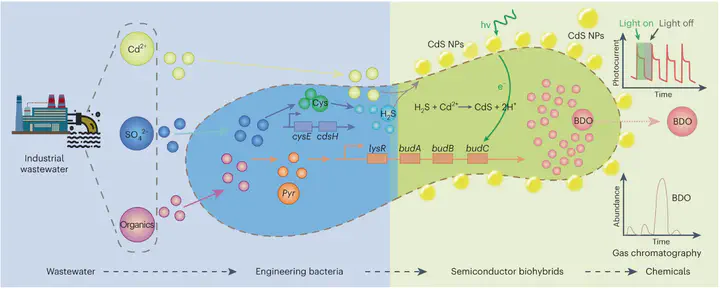Our collaborative work on microbial hybrids for wastewater treatment is published in Nature Sustainability!

Our collaborative work on microbial hybrids for wastewater treatment is published in Nature Sustainability! Check the link https://www.nature.com/articles/s41893-023-01233-2
Semiconductor biohybrids integrating the merits of living cells and semiconductor materials have the potential to shift the current energy-intensive chemical production system to a more sustainable one by offering efficient solar-to-chemical conversion. However, cost-competitive and environmentally friendly scaling-up approaches are still urgently needed. To tackle this challenge, we propose a strategy that co-utilizes pollutants in wastewater to produce semiconductor biohybrids in-situ for scalable solar-to-chemical conversion. Specifically, we introduce an aerobic sulfate reduction pathway into Vibrio natriegens to enable the direct utilization of heavy metal ions (that is, Cd2+), sulfate and organics in wastewater to biosynthesize functional semiconductor nanoparticles in living V. natriegens to assemble semiconductor biohybrids. Meanwhile, a designated biosynthetic pathway is introduced into the biohybrids to enable the production of 2,3-butanediol, a valuable bulk chemical with wide applications, from organics in wastewater. Using the obtained biohybrids, the production of 2,3-butanediol reaches 13.09 g l−1 in a 5-l illuminated fermenter using wastewater as the feedstock, revealing its scalability. Life-cycle assessment shows that this specific biohybrid route has substantial sustainability gain compared with conventional 2,3-butanediol production routes. This work can bring solar-driven biomanufacturing and waste-to-wealth conversion one step forward and pave the way to cleaner production and circular economy.